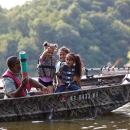Visit Us
Come visit us. You can enjoy hiking, birding, wildlife watching, and picnicking at the hatchery grounds.
We have a hike-walking trail that follows Herring Creek and travels up to the 99-acre Harrison Lake, where you can also enjoy boating (non-motorized) and fishing. Visit Virginia Fishing Regulations and Licenses for more information on fishing in Virginia. Our hiking trail also takes you around the hatchery and through a large loblolly pine forest, past wetlands, and Herring Creek. Insect repellent and protective clothing are suggested during warm weather due to the presence of biting insects and poison ivy.
Call 804-829-2421, or email rachel_mair@fws.gov to schedule a tour. We welcome schools, homeschoolers and youth groups.
Location and Contact Information
Tours
Call 804-829-2421, or email rachel_mair@fws.gov to schedule a tour. We welcome schools, homeschoolers and youth groups for tours anytime.



